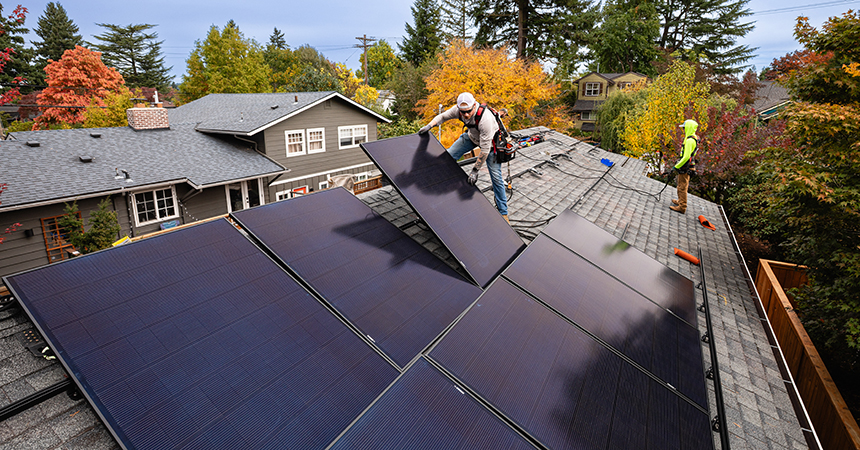
While it might sound like a low-cost path to solar benefits, it’s important to do your homework before signing a contract. Energy Trust is increasing cash incentives for solar and battery storage for 2026. But with the federal tax credit for home solar expiring at the end of 2025, chances are you will start hearing more about third-party solar ownership options such as solar leases or power purchase agreements. These arrangements involve signing a contract with a company that owns and maintains the solar system on your home, rather than you purchasing the panels outright.
Understanding solar leases and power purchase agreements—and how they work
There are two models of third-party solar: leases and power purchase agreements (sometimes called PPAs). The two pathways are similar in that a solar developer – a third party – owns and maintains the solar system on your home instead of you.
With a lease, you make a monthly payment to the solar developer to use the solar system, regardless of the amount of energy it produces. Think of it like an auto lease — your monthly payment stays the same no matter your mileage.
Under a power purchase agreement, you instead agree to pay a fixed rate to buy the solar energy generated from the system on your home.
Is it right for you? Things to be aware of
Before locking into a third-party ownership agreement, review the contract carefully to be sure you really understand the commitment you are considering. Here are some important things to understand:
- It can be a long-term obligation: While some third-party ownership agreements may be as short as five years, other contracts can lock you into a monthly payment for 15 to 25 years.
- Payments may increase over time: Some contracts include escalator clauses that will push monthly payment obligations higher over the years.
- Company reputation matters: The company will own the equipment and is responsible for any maintenance or repairs. But will the quality of their work meet your expectations? What happens if your roof needs repair or replacement? And if you’ve signed a 25-year contract, will they still be around to honor their commitment? Regardless, you might still be on the hook for the monthly payments.
- It may complicate a home sale: If you decide to move before your contract is up, a third-party ownership agreement can discourage buyers. Homebuyers are often hesitant to take on a lease that they never agreed to. Transferring the lease can also be complicated.
- It doesn’t add value to your home: If you own a solar system, it can increase the value of your home. But that’s not the case with a lease or power purchase agreement because you don’t own the system—the third-party company does.
- Systems are not eligible for Energy Trust cash incentives: Customers of PGE or Pacific Power who buy their own solar systems may qualify for Energy Trust cash incentives to help lower their project costs. But solar installations through third-party agreements currently do not qualify for Energy Trust solar incentives.
- It may not save money: A solar lease or power purchase agreement sounds appealing because you can avoid a significant up-front investment. But you should do the math and figure out if the monthly solar savings will offset your monthly payment over the long haul, especially if the contract includes an escalator clause that increases your monthly payments over time.
Buying your own system is usually better
If you have the cash or can access a low-interest loan, installing your own system is usually better than a lease or power purchase agreement because you will save more money in the long run. When you work with an Energy Trust solar trade ally, you can claim Energy Trust cash incentives that reduce project costs — and we have increased incentives for solar and battery storage for 2026. All the savings from solar will show up on your energy bill, and you won’t have to share with a third party. Plus, you will own the system, so it will boost your property value and you will avoid complications if you want to sell your home.
If you can’t fit a solar installation into your budget right now or your roof isn’t suitable for solar panels, the Oregon Community Solar Program is also a good option. You can subscribe to a community solar project and get credits on your electric bill.
Ready to explore solar or solar + storage for your home? We can connect you with Energy Trust solar trade allies. Request a free, no-obligation analysis and bid.
Working with an Energy Trust trade ally makes your project eligible for Energy Trust cash incentives. Funding for our incentives is made possible through the customers of Portland General Electric and Pacific Power.
